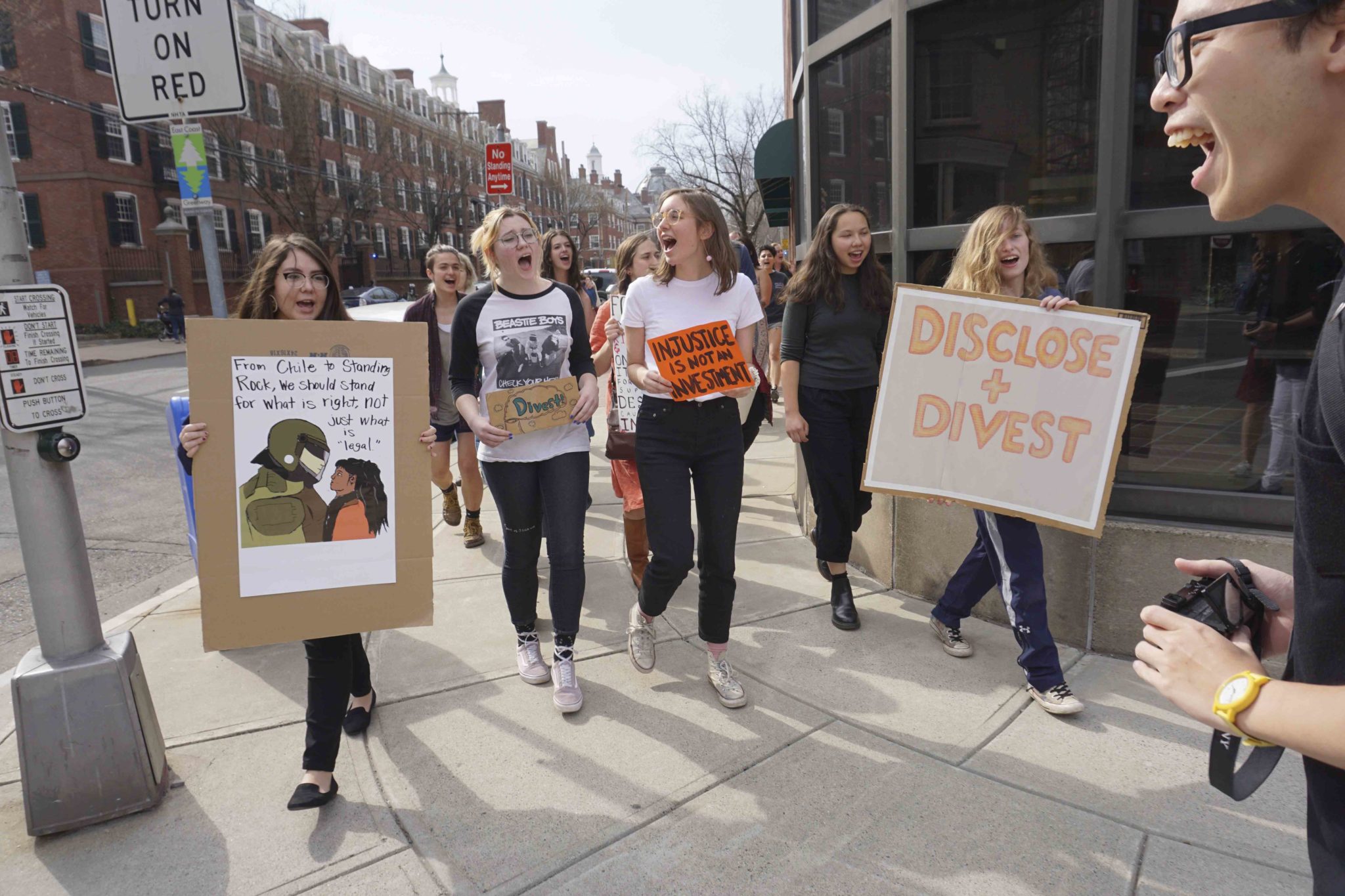
Around 30 members and supporters of Fossil Free Yale, a student group dedicated to pressuring the University to divest its endowment from the fossil fuel industry, delivered a set of demands to the Investments Office on Friday afternoon.
Chanting “Yale says more money; we say time’s up,” students gathered outside the office while two members of Fossil Free Yale entered the building and presented the list to an assistant to Chief Investment Officer David Swensen. In addition to urging Yale to disclose its holdings in fossil fuel companies and exposure to Puerto Rican debt by Sept. 1, the protesters demanded that the University begin divesting from fossil fuels and instructing fund managers to forgive Puerto Rican debt by the same date. Zach Montas ’21, a member of Fossil Free Yale and attendee at the rally, said the set of demands marks the start of a long advocacy campaign that will escalate in the fall, if Yale fails to comply.
In a statement to the News on Monday, the Investments Office said Yale has taken “a constructive approach” that addresses fossil fuel concerns across its investment portfolio. The Yale Corporation Committee on Investor Responsibility — which presents recommendations on endowment investment decisions to the full Corporation — decided against recommending fossil fuel divestments in 2014.
“Climate change is a serious issue,” the Investments Office’s statement said. “Yale has gone on the record to say that greenhouse gas emissions ‘pose a grave threat to human existence’ and asked our external managers to avoid companies that refuse to acknowledge the social and financial costs of climate change and that fail to take economically sensible steps to reduce greenhouse gas emissions.”
The office did not address students’ demand that managers cancel Puerto Rican debt in the statement.
In an email to the News Monday night, law professor and chair of the Advisory Committee on Investor Responsibility — which advises the Yale Corporation Committee on Investor Responsibility on ethical investments — Jonathan Macey said that the advisory committee has considered the issue of Puerto Rican debt.
“Thus far we haven’t seen [any] allegations of unethical debt collection efforts or practices,” Macey wrote. “In addition, the managers who control these investments have fiduciary duties to their investors that likely preclude them from unilaterally forgiving Puerto Rico’s payment obligations should any arise in the future.”
The statement also highlighted actions the Investments Office has taken in recent years to address fossil fuel concerns. In August 2014, Swensen wrote to all of Yale’s active investment managers, urging them to consider the impact of climate change when evaluating investment opportunities. And, in an email to the Yale community in April 2016, Swensen stated that since his 2014 letter, Yale’s investment managers had sold $10 million in holdings that were deemed inconsistent with Yale’s approach.
In response to the activists’ request that Yale disclose its portfolio holdings, the Investments Office said that doing so would be “antithetical to a successful active management program.”
“Disclosing Yale’s investment holdings would impair the University’s ability to generate excess returns,” the office wrote. “Disclosure is not essential to what the activists are attempting to achieve, because under Yale’s ethical investment policies and practices, Yale will consider divestment of any investment, regardless of whether the targeted company is in Yale’s portfolio.”
In a 2014 statement, the Yale Corporation Committee on Investor Responsibility argued that while climate change poses a grave threat to human welfare, the actions that Fossil Free Yale proposes Yale take — divestment or shareholder engagement as a precondition to divestment — “are neither the right means of addressing this serious threat, nor would they be effective.”
Both the committee’s 2014 statement and the Investments Office’s Monday statement say that fossil fuel consumption, not production, is the root cause of climate change. Unless alternative energy technologies and infrastructure are developed and widely implemented, fossil fuels will remain essential to some degree, the office wrote.
Responding to the office’s statement, Fossil Free Yale member Ben Levin ’20 said Swensen relied on economic arguments — as opposed to social considerations — in both his 2014 email advising money managers to consider the risks of climate change and in his justification for not disclosing Yale’s holdings.
“The logic of maximization that they are concerned with, that they are using to justify their nondisclosure, is the problem,” Levin said.
He added that placing the blame for climate change primarily on fossil fuel consumers fails to take into account political campaigns led by Exxon Mobil and other oil and gas companies since the 1970s that have resulted in a retreat from climate mitigation policies.
He added that the Investments Office’s argument that fossil fuels are still essential to many of life’s basic necessities does not justify Yale’s investments in fossil fuels.
“Yale divesting is not going to make fossil fuel suddenly disappear,” Levin said, adding that Yale divesting would be a political statement.
Jack Schleifer ’20, a Fossil Free Yale member and attendee at the rally, stressed that climate change disproportionately affects island residents and people from disadvantaged socioeconomic backgrounds. Given Yale’s standing as a powerful institution, Schleifer said, divesting the endowment from fossil fuel companies would represent a strong public statement.
Yale’s endowment amounted to $27.2 billion as of June 30, 2017.
Jingyi Cui | jingyi.cui@yale.edu







